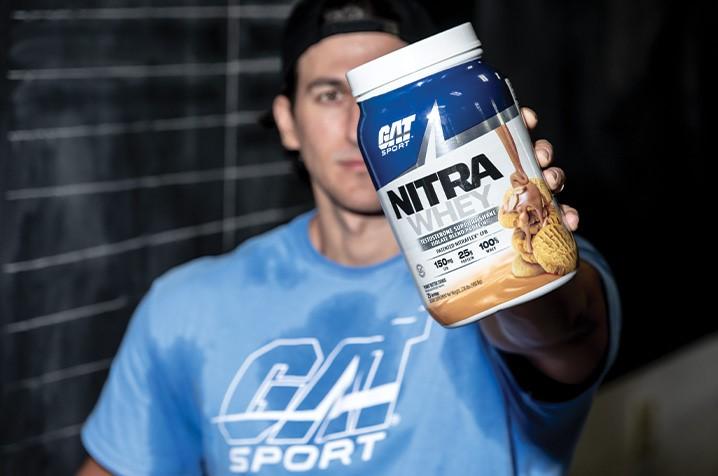
9 Protein Powder Myths You Should Stop Believing Today
What if we told you that everything you think you know about protein powders — is wrong. There’s a web of protein powder myths swirling around on the internet. Let’s dispel the myths and get you properly informed! Mix up your favorite protein powder, have a sip, and read on:
Myth #1 - You should drink a lot of protein right after your workout.
FALSE! Drinking a large amount of protein right after your workout is unnecessary. It is true, however, that having some protein and carbohydrates 30 to 60 minutes after your workout helps your body recover from the stress you put on it during training.
Myth #2 - Women will get bulky if they drink protein powder.
FALSE! Protein powder alone doesn’t make women bulky. It’s a purpose-driven diet designed with excess calories along with strict weight training that can make women appear to be bulky or look like they’re bulking up.
Myth #3 – All protein powders are expensive.
FALSE! At first glance, $30 - $50 per bottle may be tough for some people to justify, but bear in mind that most protein powder bottles contain a 15- to 30-day supply. Check out all the benefits that it will bring you, and you’ll easily see its value to your training regimen. At minimum, they should contain essential nutrients and vitamins key to your training success.
Myth #4 - All protein powder has caffeine in it.
FALSE! Contrary to popular belief, not all protein powders automatically contain caffeine. Always check the ingredients panels to know precisely what you’re putting into your body.
Myth #5 – All protein powder is high in calories.
FALSE! Not all protein powders are created equal. There are some protein powders designed to be higher in protein. Others specially formulated for bulking up, are higher in calories. Simply pick a protein powder that matches your bodybuilding goals.
Myth #6 - Protein Powder contains too much protein.
FALSE! The ideal amount of protein to consume daily depends mainly on your weight and activity level. For an average person, that’s between 1.6 to 2.2 grams of protein per kilogram of body weight. If you work out every day, ideal amount climbs to between 2.2 and 3.4 grams of protein per kilogram of body weight. It’s recommended that 10-35% of your daily caloric intake comes from protein. If you’re trying to gain a pound of muscle, your body needs about 10 to 15 grams of extra protein per day.
Myth #7 – The human body can only absorb 30 grams of protein at a time.
UNDECIDED! There is some controversy over whether or not the body can absorb 30 grams of protein at a time. Some bodybuilders wonder if they should even be drinking a protein shake’s 50 or even 80 grams of protein per serving. The precise amount of protein the body can absorb at once depends on the person. Using protein to restore and build muscle is not the only reason it’s used, so you’re better off eating more in each sitting. The rule of thumb is that it’s best to distribute your protein intake throughout the day just as you would distribute calories, carbs, sugars, etc., throughout your day.
Myth #8 – Hands down, the best type of protein is whey protein.
FALSE! There is no one “best” type of protein. Whey protein happens to be absorbed quickly by the body and is rich in branched-chain amino acids (BCAAs). So, many gravitate to whey protein simply for those reasons. Do yourself a favor and learn about all protein powder types. You’ll be glad you did!
For example, check out the differences between this whey protein isolate blend and a protein designed for bulking up. They’re both significant protein powders, but for different purposes.
Myth #9 – The “dairy” in protein powder will upset the stomach.
FALSE! Another common myth about protein powder is that it causes everyone stomach upset, due to its dairy content. Actually, whey protein doesn’t have much dairy lactose in it. High doses of whey protein can cause side effects like upset stomach, nausea, dehydration, bloating, cramps, loss of appetite, fatigue, and headaches. But stick to label directions and unless you’re lactose intolerant, you should be fine. If you’re using whey protein every day — or if you’re allergic to milk from cows, consider a non-dairy protein powder, or a Plant Protein. Your body will thank you for it!
Protein is important to every cell in your body. TRUE! It helps you build and repair tissues, make enzymes, hormones, and other essential chemicals vital to health and well-being. Plus, protein is an important building block for bones, muscles, cartilage, skin, and blood. By consuming an ideal amount of protein daily, you’re not only helping your body function at peak performance and stay healthy. You’re also helping build bigger, stronger muscles — getting the gains you’re looking for!
Are you struggling to consume the right amount of protein? Read 8 Ways to Add More Protein-Rich Foods into Your Meal Plan.
And, don’t deprive your sweet tooth. We found this guilt-free protein powder brownie bites recipe to enjoy whenever you’re craving a treat. Check out this Guilt-Free Protein Powder Brownie Bites Recipe. To the brownie mix, just add your favorite protein powder, or one of these options from GAT Sport. You can eat these guilt-free protein powder brownies knowing you’re still getting key nutrients and protein that’ll help you build muscle.


